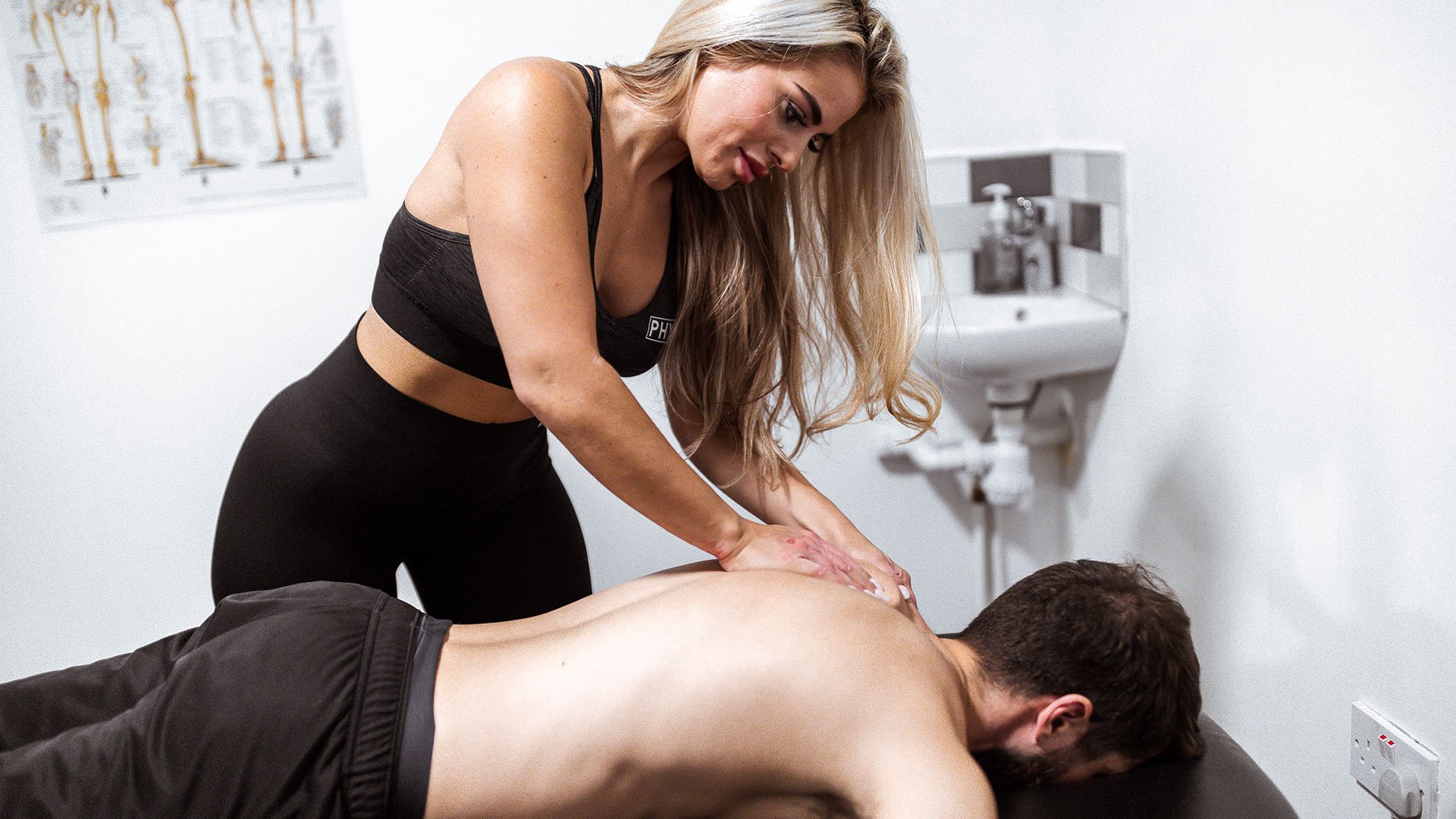Main Takeaways
- Physiotherapy is a hands-on treatment that assesses, diagnoses, and treats a wide range of physical conditions, aiming to improve mobility, flexibility, and function.
- Physiotherapists are highly trained professionals registered with the Health and Care Professions Council (HCPC), ensuring regulated and accredited care.
- Treatment plans are personalized, beginning with a thorough assessment and diagnosis, followed by tailored sessions that may include manual therapy, exercises, and education.
- Types of physiotherapy include musculoskeletal, sports, neurological, paediatric, cardiac, and respiratory, each addressing specific patient needs.
- Benefits of physiotherapy encompass pain relief, optimized healing, injury prevention, improved mobility, posture correction, and enhanced sports performance.
Physiotherapy is used for sports injuries, surgical recovery, and back pain, just to name a few of the ailments commonly treated by physiotherapists. But what is a physiotherapy session? What does it entail, and how does it work?
These are all important questions that we will answer in our complete physiotherapy guide, written by our award-winning physio team. From understanding what physiotherapy is to knowing when you should see a physiotherapist, we will take you through everything you need to know.
Learn more about physiotherapy below and discover our London physiotherapy service today.
What is Physiotherapy?

The simplest physiotherapy meaning:
Physiotherapy is a manual treatment that assesses, diagnoses, and treats a wide range of physical conditions. It focuses on improving your mobility, flexibility, and function, whether you are affected by an injury, illness, or just aches and pains that won’t go away.
The ultimate goal for physiotherapy sessions is to help rehabilitate you, manage and erase your pain, and prevent future injury. Physiotherapy is highly effective and suitable for people of all ages and abilities. 5.2 million NHS patients alone visited a physiotherapist in 2019-2020, and demand has only grown since.
The kind of physiotherapy you require really depends on what ails you. But one thing all types of physiotherapy have in common is that they are conducted by a professional physiotherapist.
Physiotherapists – What They Do
A physiotherapist is a highly trained specialist. To become a physiotherapist, the professional will have attained a degree through university or a degree apprenticeship and have registered with the Health and Care Professions Council (HCPC). So, you can rest assured that all physiotherapists in the UK are accredited and regulated.
The role is all about health and wellness, helping patients (like you) to maintain freedom through restoring movement and function. Our team of physiotherapists in London want to permanently fix your body so you can live pain-free, for example.
You can rely on a physiotherapist for assessments, diagnosis, and treatment. As part of the training to become a physiotherapist, we become experts in:
- Anatomy and physiology
- Musculoskeletal conditions
- Cardiopulmonary conditions
- Neurological conditions
We can also specialise in certain areas, like pre and postnatal physiotherapy, medical rehab, sports injuries, and paediatric conditions, to just name a few.
Being a physiotherapist means we’re ready to be hands-on. During sessions, we’re pros at assessing, diagnosing, and communicating with you to help you understand what’s happening as we go through manual treatments.
It’s important that you know exactly what experience, expertise, and accreditation your physiotherapist has, from their HCPC registration to potential membership with the Chartered Society of Physiotherapy.
At One Body, all our physiotherapists are experienced professionals, and you can choose who you want to see through our online booking system.
How Physiotherapy Works (What to Expect)
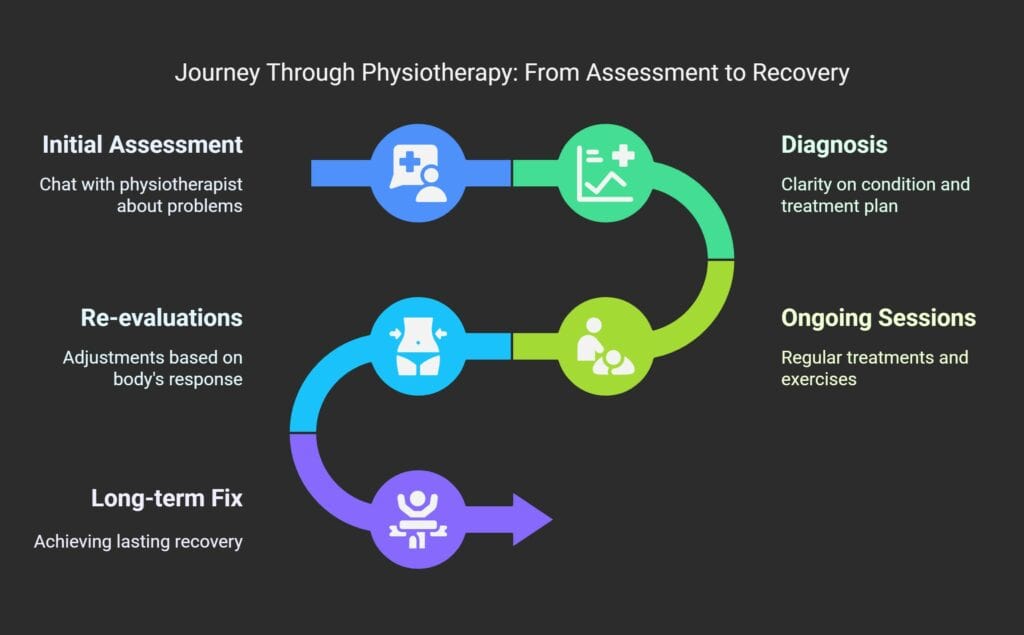
Whether you book into a private physiotherapy clinic or are referred through the NHS, this is what happens at physio.
1. Assessment
You start with an assessment, where you can chat with your physiotherapist about your problems.
This is the time to go through your:
- Medical history and family history
- Current medical problems and medications
- Pain levels and how it impacts your daily life
You’ll also get a physical assessment, where your physiotherapist will assess your:
- Posture
- Mobility and joints
- Reflexes
- Strength levels
- Balance
- Endurance
- Areas of pain (or where pain may be referred from)
There’s no jumping to treatment or exercises without a thorough assessment first.
2. Diagnosis
During that first assessment, you’ll also get a diagnosis. This might be confirming what your physician has told you, or if you are visiting a physiotherapist for an undiagnosed condition, it’s a chance to gain clarity.
You’ll find out what is causing issues and how we can help you.
3. Ongoing Sessions
The next step after you have been assessed and diagnosed is creating an ongoing treatment plan. Physio is a hands-on process conducted through numerous regular sessions.
At each session, your physiotherapist will use treatments and exercises (see below!) to aid your recovery. They might also provide advice and guidance on how to move and prevent injury between sessions.
Importantly, physio often involves constant re-evaluations to assess how your body is handling the treatment and identify other problems that might emerge. So, you should feel comfortable and confident in your physiotherapist so you can communicate how you feel and address concerns.
The number of sessions you need, the length of the sessions (often 25 to 80 minutes), and the frequency of sessions are all highly variable. Some people come to us and only need two or three sessions to focus on an injury.
Others who come to us with long-term, posture-related, and age-related aches and pains, may need quite a few more. Remember, it’s about finding a long-term fix.
Tip: the best way to find out how many sessions you’ll need and other details, such as the cost of sessions, is to book an initial assessment. You can find a physiotherapist clinic near your location or book an assessment for physiotherapy in London through us.
Physio Treatments and Exercises
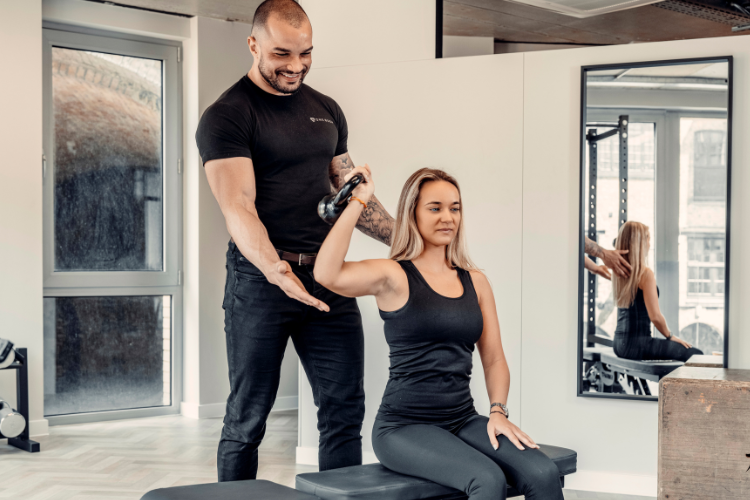
Each session at the physio clinic is conducted in a private treatment room or gym area. Whether you are exercising with your physiotherapist or receiving manual therapy, we provide all the equipment.
You just need to bring yourself and wear comfortable, flexible, and breathable clothing – a T-shirt and leggings is a great choice. You can also bring a pair of loose-fitting shorts for easier access to assess your legs.
Common treatments that we may use include manual therapy and prescribed exercise techniques.
Examples include:
- Soft tissue massage
- Deep tissue massage
- Acupuncture
- Sports taping
- Strength training and conditioning
- Athletic rehabilitation
- Injury rehabilitation
- Vestibular physiotherapy
- Personal training
- Osteopathy-specific techniques
Whether you need an expert in sporting injuries, ankle problems, knee physiotherapy, or athletic performance, your physiotherapist will use a range of techniques to take a holistic approach.
Your sessions are tailored to your body, medical issues, and goals – a unique blend of exercises and therapies that you can’t just find on YouTube.
Types of Physiotherapy Explained
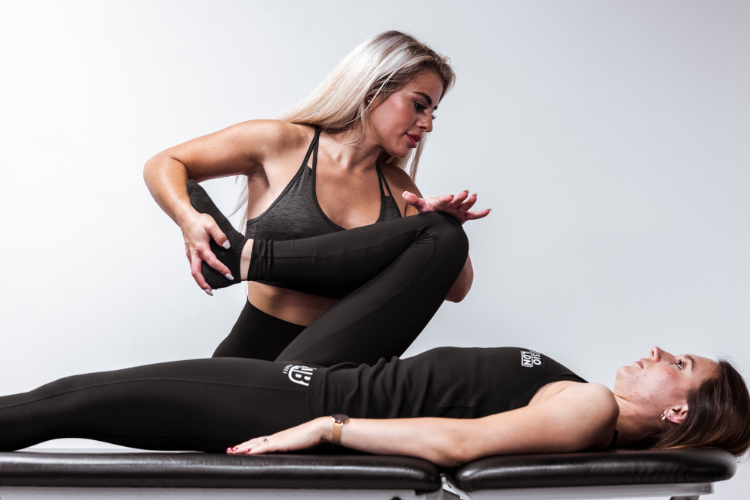
The type of physiotherapy you need depends on your condition – if you aren’t sure, you can discuss this with a physiotherapist during your initial assessment. We don’t expect you to know everything!
Musculoskeletal Physiotherapy
Any aspect of your body that involves your bones or muscles is covered by musculoskeletal physiotherapy. So, everything from arthritis and tendonitis to strained muscles and general back pain are covered by this type of physio. You’ll find physiotherapists in London who specialise in specific conditions, too, like physiotherapy for sciatica.
Manual therapy and exercise are most beneficial for musculoskeletal physiotherapy. We work to reduce pain and restore mobility using holistic techniques.
Physiotherapy exercises for lower back pain, for example, may also target the core muscles, hip flexors, and glutes for surrounding strength and support.
Sports Physiotherapy
Sports physiotherapy overlaps with musculoskeletal physiotherapy, focusing on muscle, bone and joint problems associated with sports. This includes sports injuries, as well as reduced or declining performance.
Sports physiotherapy exercises focus on recovery, enabling you to build strength, agility, and endurance, whether you’re a casual player or a professional athlete.
Neuro Physiotherapy
Neurological physiotherapy involves treating symptoms of neurological conditions. After a stroke or traumatic brain injury, physio can be part of a strong rehabilitation plan. Neurophysiotherapy can also help those with long-term conditions like MS or Parkinson’s.
The core of neuro physio is helping patients regain bodily functions to improve their quality of life. The exercises we use focus on your fine motor skills, balance, and coordination while rebuilding lost muscle and strength.
Paediatric Physiotherapy
Paediatric physiotherapy is physiotherapy for kids – from infants through to teens as old as 19. It focuses on developmental problems that impact physiology and movement.
This can range from simple coordination problems and delayed development to neurological conditions like cerebral palsy and childhood cancers.
Paediatric physiotherapists are highly specialised and skilled – you’ll be referred to one by your doctor if needed. Children’s physiotherapy treatments focus on learning essential skills, strengthening muscles, increasing endurance, and minimising pain.
Cardiac and Respiratory Physiotherapy
Cardiac physiotherapy and respiratory physiotherapy are highly targeted – they focus on issues of the heart and lungs. For example, if you’ve had heart surgery or a coronary artery disease diagnosis, cardiac physio uses exercises and techniques to help you manage symptoms and reduce the likelihood of further complications.
Likewise, respiratory physiotherapy can be used to manage and treat pulmonary conditions, including asthma and COPD.
Treatments used vary significantly but tend to focus on education as well as life-long tips to manage the condition and exercises to rebuild strength. Reaching and maintaining optimum health is crucial here.
Do I Need Physiotherapy?
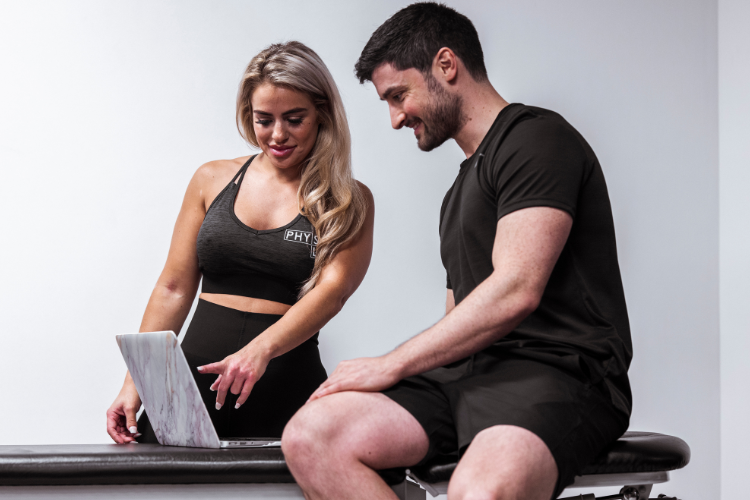
The most obvious sign that you need physiotherapy is if your doctor tells you so! But if you haven’t been referred by a doctor (or are still waiting to even get a GP appointment) then you might be considering finding a physio by yourself.
Here are some key signs that booking a physio assessment may be the right move:
- You’re in constant pain, localised to one area or across your body.
- Your range of motion, mobility and flexibility is declining.
- You think you have a sports injury.
Some of the most common ailments we treat include poor
(which can lead to shoulder tension, back pain, and even headaches), lower back pain, joint aches, and balance and coordination problems. Physiotherapy can also be part of surgical or post-natal recovery.
As the initial physiotherapy assessment is easy to book at One Body, you can quickly find out if physiotherapy is the right path for you.
Finding a Physiotherapist in the UK
Physiotherapists can be found all over the country and in different facilities. Besides hospitals, physiotherapists can be found in community centres, sports clubs, and of course, private clinics. Though every professional must have a degree and be registered to practise in the UK, not all physiotherapists can do all kinds of physiotherapy.
So, finding a physiotherapist in the UK is all about finding a professional with the expertise you need. At One Body, for example, we have physiotherapists specialising in sports injuries, women’s health physiotherapy, orthopaedics, deep tissue massage, and many other niche areas. We’ve assembled a team across London so we can help as many people as possible.
Private Physiotherapy vs NHS Physiotherapy
All physios practising in the UK are registered and accredited, with standardised educational requirements too. So, is there really any difference between NHS and private services?
The answer is yes! NHS physio is free, while private physiotherapy requires you to pay out of pocket or use your health insurance. But that’s not the only difference.
- Anyone can book private physio, while you must be referred for NHS physio.
- The waiting times for NHS physio may be long, while private clinics are available now.
- A diagnosis may take time and require referrals with the NHS, but it can be given at the first private assessment.
- You may not have a choice of appointment times and schedule with the NHS, but with a private clinic you can book physio around your lifestyle.
You can also “shop around” for private physio, choosing a physiotherapist who has relevant experience or uses particular techniques you are looking for. It’s this freedom that makes private physio in London and around the country so popular.

The Benefits of High-Quality Physiotherapy
Professional physio has numerous proven benefits and is a widely accepted form of treatment. It’s offered by healthcare services around the world, including the NHS, as well as private practices.
Here are some of the benefits you could experience after you find physiotherapy in London.
Pain Relief
Pain is the unifying factor that so many physiotherapy patients face. Whether you are suffering from a sports injury, a chronic bad back, or just isolated pain in your neck, knees, shoulders, or hands, physiotherapy can help.
There are endless studies (and customer testimonials) showing that physiotherapy can significantly reduce your pain. A review of several hundred studies, all looking at pain intensity levels and the effects of physiotherapy, found that physio has a moderate effect on pain across the board.
Optimised Healing
Musculoskeletal physio can be very effective for regenerating skeletal muscles, tissue healing, and perhaps even wound healing. Post-operative physio is recommended after numerous types of surgery to prevent consequences, including cardiac, neurological, and abdominal surgeries. For example, pelvic floor physio might be recommended during postnatal recovery.
The key is to follow your doctor’s advice. The NHS might offer you physio, or you can book private physiotherapy sessions to avoid the waiting lists – whatever you choose, your physiotherapist will make sure that the practices they use are suitable for post-operative recovery.
Prevent Injuries
Exercise guided by a physiotherapist can help you train and build strength while reducing the likelihood of injuries. Physiotherapists can do this by teaching you the correct technique when stretching and working out.
Physiotherapy techniques, such as stability training and eccentric training, have been proven to reduce some common injuries too, like hamstring injuries.
Better Mobility
Active exercise therapy and manual therapy can enhance your mobility. This is great for improving your performance (see sports performance below) and maintaining mobility as you naturally age.
For knees, shoulders, and other problem joints, physiotherapy has been shown to improve range of motion and general mobility while reducing pain and healing injuries.
Healthy Posture
Postural realignment is a popular type of physiotherapy that aims to correct your posture. This isn’t just about standing up straight – posture relates to how you move, adapt and interact with the world.
Thoracic and lumbar spine exercises, as well as leg stretches, can help correct your posture. The benefits of good posture range from reducing back pain to reducing pressure on your joints and even improving maximum lung capacity.
Increased Sports Performance
Finally, physio can be beneficial for unlocking your peak performance. Along with a sports massage, physio speeds up recovery, increases mobility, and teaches you to better understand your body.
Through prescribed conditioning exercises, physio can help improve your strength, range of motion, and mental state too. This can help you stay at the top of your game and get in great shape.
If you would like to find out how physiotherapy can benefit you, discover One Body London physiotherapy today.
Physio FAQs
What is a physiotherapy treatment?
Physiotherapy treatment is the use of physical, hands-on techniques to treat medical concerns. Conducted by a physiotherapist, these treatments can be highly effective for reducing pain, treating sports injuries, and improving posture and mobility.
How does physiotherapy work?
Physiotherapy works by using manual therapy (e.g. soft tissue massage) and prescribed activities (e.g. physiotherapy exercise for knee pain) to reduce pain, improve mobility, and encourage recovery. You see a physiotherapist over numerous regular sessions, with the aim to resolve your ailments for the long term.
How much does physiotherapy cost?
For physiotherapy in London, our prices start at around £89 for a 50-minute session. The exact cost depends on the length of the session, time schedule, and seniority of the therapist. NHS physio sessions are free, while private physio sessions may be covered by health insurance.
What to wear to physiotherapy?
Comfortable, breathable, loose fitting clothing is the key. Physio is a hands-on treatment, so you need to wear something that allows both you to move and the therapist to assess your movements. A light cotton t-shirt and either loose-fitting shorts or joggers is perfect for both manual therapy and physio exercises.
How to self refer to physiotherapy?
Self-referral on the NHS is only available in certain areas of the UK – everywhere else, you’ll need to be referred by another healthcare professional. If your doctor hasn’t referred you to physiotherapy, or you just don’t want to join the NHS waiting list, you can contact any private physiotherapist to arrange an assessment. Some clinics (including ours) offer initial assessments and ongoing sessions covered by private insurance.
What is the difference between physiotherapy and osteopathy?
Osteopathy focuses on musculoskeletal and biomechanical issues (e.g. muscle strain, headaches), using manual therapy to treat them. Physio encompasses so much more than this, using manual therapy, massage therapy, prescribed exercise, and other techniques to treat a much wider range of conditions. For more detail information see the blog Osteopathy vs Physiotherapy in London.
How many physiotherapy sessions will I need?
This varies drastically. For acute back pain, you might need just three or four sessions. For posture-related or long-term chronic illnesses, you might need many more. You can discuss your treatment plan with the physiotherapist during your initial assessment to get an idea of how many sessions are required.
How long does a physiotherapy session last?
The average physiotherapy session lasts between 25 minutes and 80 minutes, depending on your needs and the type of physio. Physiotherapy for back pain usually involves several 25-minute sessions over a few weeks, for example.




